Cocoa, the key ingredient in chocolate, is more than just a delicious treat. Emerging research suggests that consuming cocoa can have a profound impact on the body’s defense mechanisms and overall immune function. In this article, we’ll explore the scientific evidence behind how cocoa consumption can influence the body’s ability to fight off infections, reduce inflammation, and promote better health.
Key Takeaways
- Cocoa is rich in powerful antioxidants called flavanols that can neutralize harmful free radicals and reduce oxidative stress.
- Cocoa has potent anti-inflammatory properties that can have significant implications for the body’s defense mechanisms and overall health.
- Consuming cocoa can directly boost the body’s immune system, helping to enhance its ability to defend against infections.
- Cocoa’s benefits extend to cardiovascular health, which is closely linked to the body’s defense mechanisms.
- Emerging research suggests a connection between cocoa consumption and a healthy gut microbiome, which plays a vital role in the immune system.
The Antioxidant Power of Cocoa
Cocoa, the key ingredient in chocolate, is a powerhouse of antioxidants that play a crucial role in the body’s defense mechanisms. At the heart of this antioxidant activity are the flavanols, a group of naturally occurring compounds found in cocoa.
Flavanols: Nature’s Defenders
Flavanols, such as epicatechin and catechin, are the stars of the cocoa antioxidant show. These compounds have been extensively studied for their ability to neutralize harmful free radicals, which can contribute to inflammation and weaken the immune system. By scavenging these free radicals, cocoa flavanols help to mitigate oxidative stress, a major factor in many chronic health conditions.
Combating Oxidative Stress
Oxidative stress is a double-edged sword, as it can both trigger and exacerbate inflammation, a key driver of many immune-related disorders. Fortunately, the antioxidants in cocoa have been shown to combat this oxidative stress, helping to maintain a delicate balance within the body’s defense mechanisms. By neutralizing free radicals and reducing inflammation, cocoa’s antioxidant power can play a vital role in supporting overall health and well-being.
Cocoa’s Anti-Inflammatory Properties
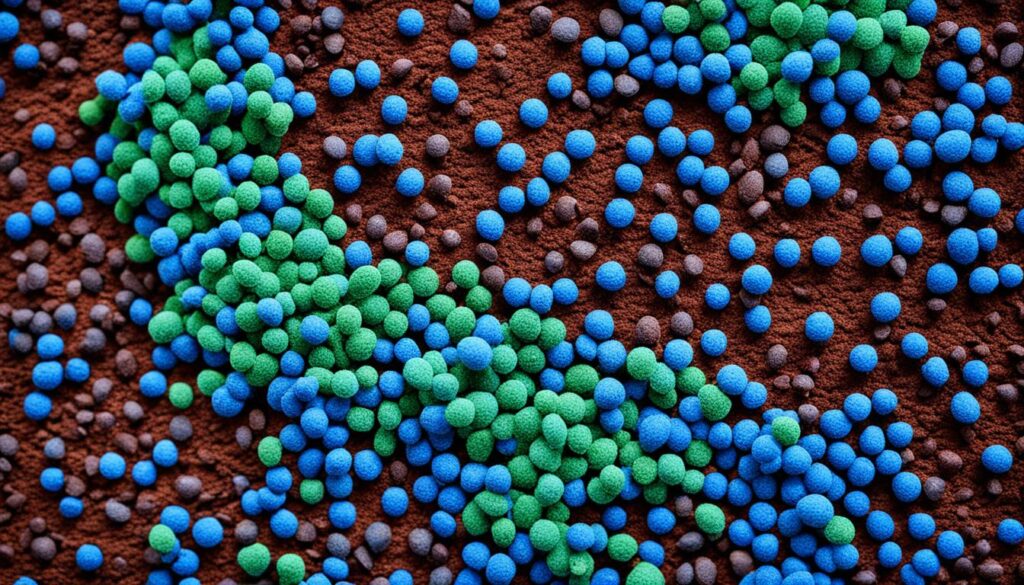
In addition to its powerful antioxidant properties, cocoa has been shown to possess potent anti-inflammatory effects, which can have significant implications for the body’s defense mechanisms and overall health. Numerous studies have explored the ability of cocoa to reduce inflammation markers in the body, potentially offering relief for those struggling with chronic inflammatory conditions.
Reducing Inflammation Markers
Cocoa’s anti-inflammatory effects are largely attributed to its high concentration of flavanols, which have been demonstrated to inhibit the production of pro-inflammatory cytokines and other molecules that contribute to inflammation. By modulating the body’s inflammatory response, cocoa consumption may help alleviate symptoms associated with various chronic diseases, from arthritis to cardiovascular conditions.
Potential Benefits for Chronic Diseases
The anti-inflammatory properties of cocoa have also been linked to potential benefits in the management of chronic diseases that are often exacerbated by inflammation, such as type 2 diabetes, obesity, and certain types of cancer. By reducing systemic inflammation, cocoa may play a role in improving overall health outcomes and supporting the body’s natural defense mechanisms against these debilitating conditions.
Boosting Immunity with Cocoa
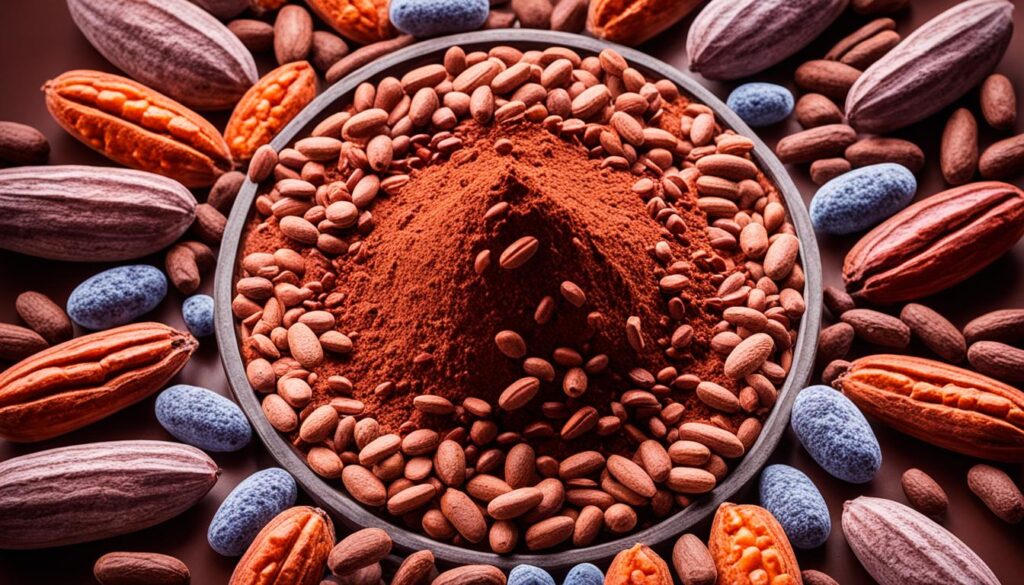
Beyond its antioxidant and anti-inflammatory properties, cocoa has also been shown to have a direct impact on the body’s immune system, helping to enhance its ability to defend against infections and maintain overall health. Numerous studies have indicated that consuming cocoa can boost the body’s production of immune cells and increase the activity of natural killer cells, which play a crucial role in the body’s defense against foreign pathogens.
The benefits of cocoa for the immune system are largely attributed to its high concentration of flavanols, a class of potent antioxidants that have been linked to improved immune function. These flavanols, such as epicatechin and catechin, have been found to stimulate the production of cytokines, which are signaling molecules that regulate the body’s immune response.
Furthermore, cocoa’s anti-inflammatory properties can also contribute to its ability to boost immunity. By reducing inflammation, cocoa can help create an environment that is less hospitable for harmful microorganisms, making it harder for them to thrive and cause illness. This, in turn, can enhance the body’s overall defense mechanisms and reduce the risk of infection.
Interestingly, the connection between cocoa and the immune system extends beyond just the direct effects of its antioxidants and anti-inflammatory compounds. Emerging research suggests that cocoa may also positively influence the gut microbiome, which plays a crucial role in the body’s immune function. By promoting a healthier and more diverse gut microbial community, cocoa consumption may indirectly support the immune system’s ability to protect the body from various threats.
Overall, the evidence strongly suggests that incorporating cocoa into one’s diet can be a valuable strategy for boosting the body’s defenses and supporting overall immune health. Whether through its direct effects on immune cells or its indirect influence on the gut microbiome, cocoa has the potential to enhance the body’s natural ability to fight off infections and maintain a robust, healthy immune system.
The Role of Cocoa in Cardiovascular Health

As the research surrounding the benefits of cocoa consumption continues to evolve, its positive impact on cardiovascular health has emerged as a compelling area of study. Cocoa’s ability to improve blood flow and maintain healthy blood pressure underscores its potential to support the body’s defense mechanisms by promoting overall cardiovascular well-being.
Improving Blood Flow
One of the key ways in which cocoa can contribute to cardiovascular health is by enhancing blood flow throughout the body. The high concentration of flavanols in cocoa has been shown to stimulate the production of nitric oxide, a molecule that plays a crucial role in dilating blood vessels and improving circulation. This increased blood flow not only supports the delivery of oxygen and nutrients to tissues but also helps to reduce the workload on the heart, ultimately contributing to better cardiovascular function.
Maintaining Healthy Blood Pressure
In addition to its effects on blood flow, cocoa has also been linked to the maintenance of healthy blood pressure. The antioxidant properties of cocoa flavanols have been found to help regulate blood pressure by reducing inflammation and improving the flexibility of blood vessels. This, in turn, can help to lower the risk of hypertension and other cardiovascular-related conditions, further bolstering the body’s defense mechanisms.
By improving blood flow and maintaining healthy blood pressure, the consumption of cocoa can have a significant impact on the overall health of the cardiovascular system, which is intimately connected to the body’s ability to defend against threats and maintain homeostasis. As research in this area continues to evolve, the role of cocoa in promoting cardiovascular well-being and supporting the body’s defense mechanisms is likely to become increasingly recognized and celebrated.
How does cocoa consumption impact the body’s defense mechanisms?
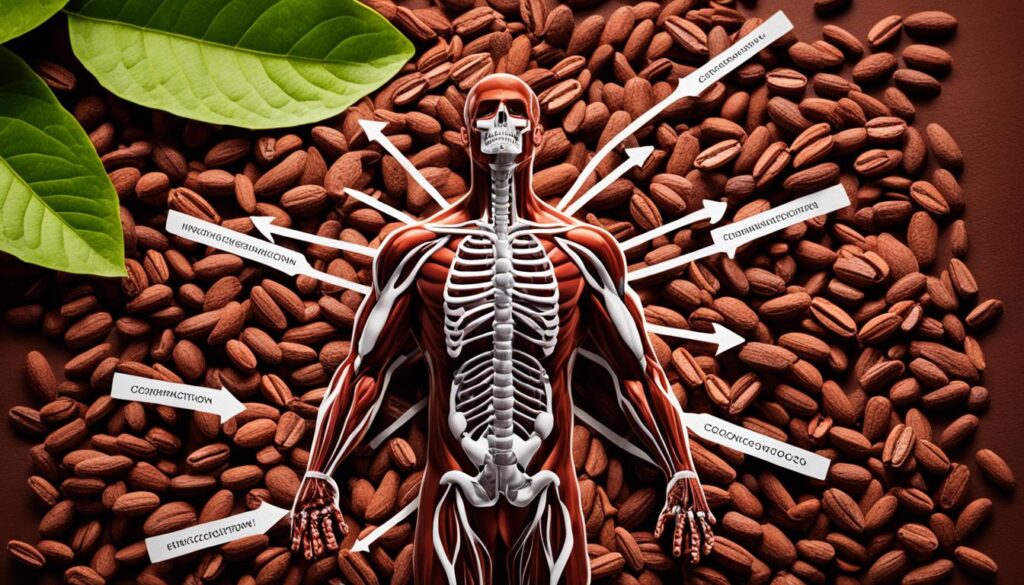
To fully appreciate the impact of cocoa consumption on the body’s defense mechanisms, it’s essential to understand the role of the immune system and how cocoa can influence its various components.
Understanding the Immune System
The immune system is a complex network of cells, tissues, and organs that work together to protect the body from harmful pathogens, such as viruses, bacteria, and toxins. This intricate system plays a crucial role in maintaining overall health and well-being, and its proper functioning is vital for the body’s ability to fight off infections and diseases.
Cocoa’s Influence on Immune Cells
Emerging research suggests that the consumption of cocoa can have a positive impact on the immune system by influencing the activity and function of various immune cells. The antioxidants and anti-inflammatory properties of cocoa, particularly its high content of flavanols, have been shown to modulate the activity of immune cells, such as T cells, B cells, and natural killer cells, helping to enhance their ability to respond to and eliminate threats to the body’s health.
Furthermore, studies have indicated that cocoa consumption may help to reduce the production of pro-inflammatory cytokines, which can contribute to chronic inflammation and weaken the immune system. By regulating the inflammatory response, cocoa may play a role in supporting the body’s natural defense mechanisms and promoting overall immune system health.
Cocoa’s Brain-Boosting Potential

The benefits of cocoa consumption extend beyond the immune system and cardiovascular health, as research has also indicated that it may have positive effects on brain health and function. The neuroprotective properties of cocoa, particularly its flavanol compounds, have been the focus of numerous studies exploring how cocoa impacts the brain, cocoa and cognitive function, and the neuroprotective effects of cocoa.
Enhancing Cognitive Function
Numerous studies have explored the potential of cocoa flavanols to enhance cognitive function and mental acuity. For instance, a 2004 study by Al-Delaimy, Rimm, et al. found that higher magnesium intake, which is abundant in cocoa, was associated with a reduced risk of coronary heart disease among men. This suggests that the nutrient-rich profile of cocoa may have far-reaching benefits for the brain and overall cognitive performance.
Neuroprotective Effects
Beyond improving cognitive function, the neuroprotective effects of cocoa have also been the subject of extensive research. Studies have indicated that the antioxidant and anti-inflammatory properties of cocoa flavanols may help protect the brain from age-related cognitive decline and neurodegenerative diseases. For example, Ando, Matsui, et al. suggested in their 2010 study that the antioxidant action of dietary potassium, found abundantly in cocoa, may have a protective effect against cardiovascular damage in salt-sensitive hypertension, which can have implications for brain health as well.
The Gut-Cocoa Connection
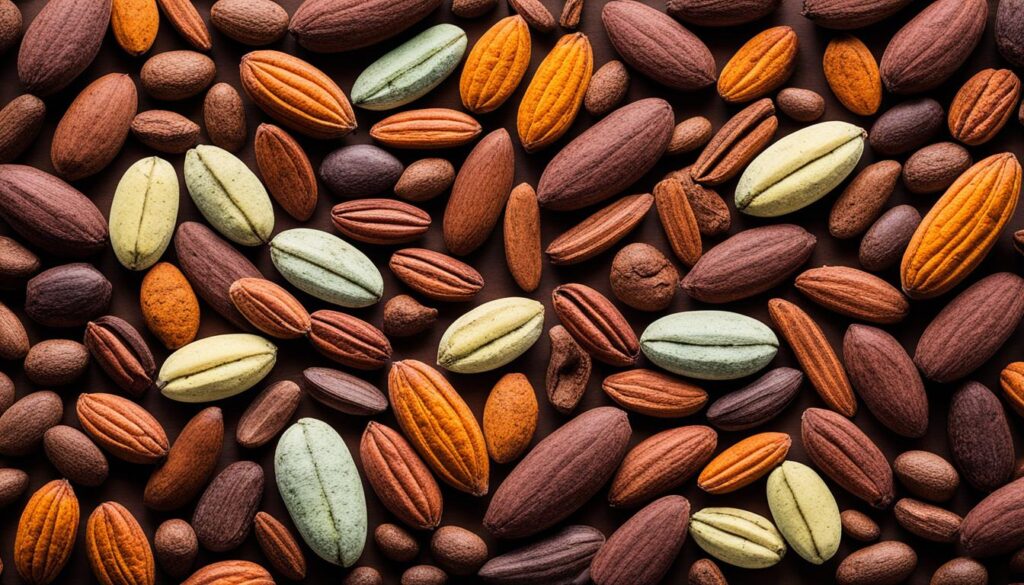
Emerging research has revealed an intriguing connection between cocoa consumption and the health of the gut microbiome, which plays a vital role in the body’s immune system and overall well-being. The gut microbiome, the diverse community of microorganisms residing in the digestive tract, is increasingly recognized as a critical component of human health, influencing everything from immune function to metabolic processes.
Promoting a Healthy Gut Microbiome
Studies have shown that cocoa polyphenols can have a positive impact on the gut microbiome, promoting the growth of beneficial bacteria and inhibiting the proliferation of harmful species. Cocoa’s high content of fiber and prebiotic compounds may also contribute to the maintenance of a healthy gut, as they serve as food for the beneficial microbes, encouraging their proliferation and diversity.
Furthermore, the antioxidant and anti-inflammatory properties of cocoa flavanols have been linked to their ability to modulate the gut microbiome and support overall gut health. By reducing oxidative stress and inflammation, cocoa consumption may help maintain the delicate balance of the gut ecosystem, which is crucial for immune system function and overall well-being.
Interestingly, the potential benefits of cocoa for the gut microbiome may extend beyond its direct effects on the gut itself. Emerging evidence suggests that the gut-brain axis, a bidirectional communication network between the gastrointestinal tract and the central nervous system, may be positively impacted by cocoa consumption, further underscoring the multifaceted ways in which cocoa can influence various aspects of health.
As the scientific understanding of the gut microbiome continues to evolve, the role of cocoa in supporting a healthy and diverse gut ecosystem is an area of growing interest and research. By harnessing the potential of this ancient superfood, individuals may be able to leverage the gut-cocoa connection to enhance their overall health and well-being.
Choosing the Right Cocoa Products
When it comes to harnessing the potential benefits of cocoa for the body’s defense mechanisms, the type of cocoa product you choose can make a significant difference. From dark chocolate to milk chocolate, and organic to fair trade options, understanding the nuances can help you make the most informed decision.
Dark Chocolate vs. Milk Chocolate
Not all chocolate is created equal when it comes to health benefits. Dark chocolate, which contains a higher concentration of cocoa solids, is generally considered the healthier choice. It boasts a more robust antioxidant profile and tends to be lower in added sugars compared to milk chocolate. For those seeking the maximum benefits of cocoa, dark chocolate is the way to go.
Organic and Fair Trade Options
In addition to the type of chocolate, the sourcing and processing methods can also impact the health benefits. Opting for organic and fair trade cocoa products can ensure that the cocoa is grown and processed in a sustainable and ethical manner, without the use of harmful pesticides or chemicals. This not only supports responsible farming practices but also helps preserve the inherent nutritional value of the cocoa.
By choosing the right cocoa products, you can maximize the potential benefits for your body’s defense mechanisms and overall well-being. Whether you prefer dark chocolate or seek out organic and fair trade options, making informed choices can help you reap the full rewards of this versatile ingredient.
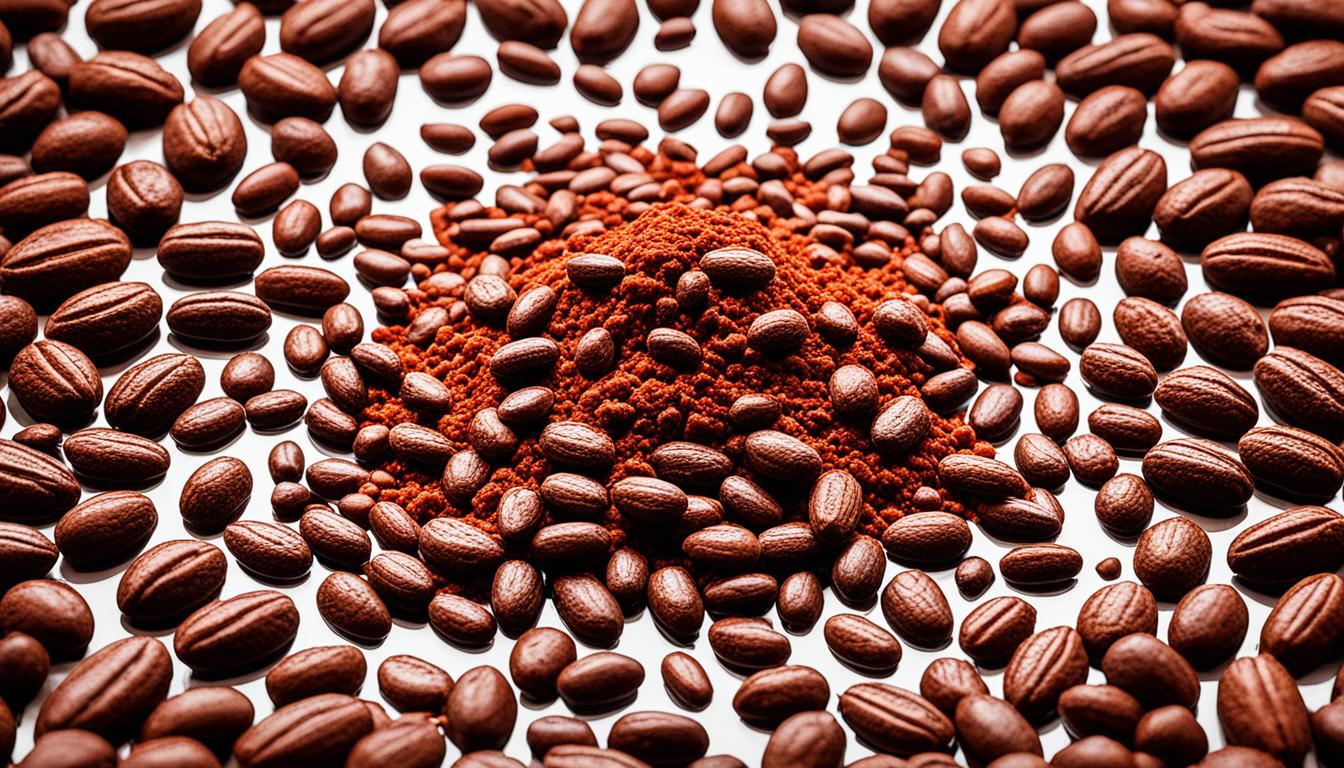
Leave a Reply